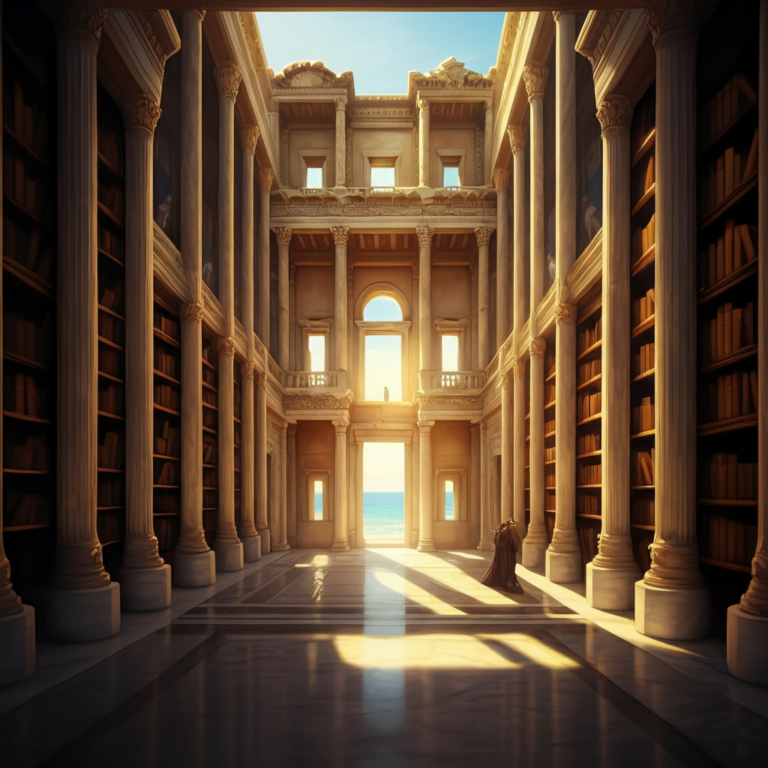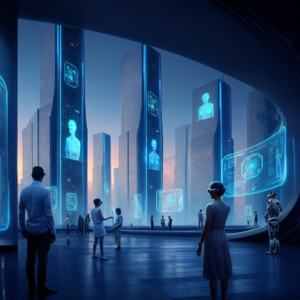The Library of Alexandria is often shrouded in mystery, intrigue, and what-ifs. Widely regarded as one of the most ambitious centers of knowledge in human history, it was more than just a library—it was a beacon of intellectual progress, housing the cumulative wisdom and discoveries of ancient civilizations. But what if this great repository of knowledge had never been destroyed? How might it have reshaped the course of human history?
In this post, we’ll explore the storied significance of the Library of Alexandria, speculate on the world we might live in had it survived, and reflect on how its hypothetical preservation could have influenced everything from science and literature to society’s understanding of itself.
The Library of Alexandria’s Role in History
The Library of Alexandria, established in the Egyptian city of Alexandria during the reign of Ptolemy II Philadelphus (283–246 BCE), was unparalleled in its scope and ambition. It aimed to collect every written work in existence, from Homeric epics to medical treatises and beyond, amassing texts written in numerous languages and sourced from across the known world.
It wasn’t merely a storage house for scrolls. The Library was part of a larger research institute, the Mouseion, which attracted some of the brightest minds of the ancient world. Scholars gathered to study astronomy, medicine, philosophy, and technology. Imagine it as an interdisciplinary think tank centuries ahead of its time, fueling advances in fields that laid the foundation for modernity.
Despite its iconic status, the details surrounding the Library’s decline and destruction are murky. Historians debate whether it burned in Julius Caesar’s siege of Alexandria in 48 BCE, fell victim to political turmoil, or was destroyed incrementally over centuries. Regardless of the cause, the world lost a treasure trove of knowledge—an enduring tragedy that raises one tantalizing question: what if it had survived?
A World Where the Library Lived On
Had the Library of Alexandria been preserved, it’s likely humanity’s trajectory would look drastically different today. Here’s how surviving ancient records might have impacted various aspects of human development:
Scientific and Technological Progress
The fate of scientific knowledge held in the Library’s scrolls dominates much of the speculation. Historians believe it may have housed texts on engineering, astronomy, medicine, and mathematics from cultures spanning ancient Greece, Egypt, India, and Mesopotamia. What if critical advancements in fields like physics or anatomy had been made centuries earlier?
- Faster Technological Evolution
Imagine the Industrial Revolution taking place during the Middle Ages. Earlier access to texts on mechanical engineering or hydroponics could have jumpstarted innovations like printing presses, steam engines, or even agricultural systems—dramatically speeding up humanity’s technological curve.
- Medical Breakthroughs
Some records reportedly described advanced surgical practices and herbal remedies. Had these persisted and evolved uninterrupted, diseases like smallpox or the bubonic plague might have been eradicated far earlier, reducing the loss of millions of lives.
Literature and Philosophy
The Library’s mission to collect works from every corner of the world could have safeguarded priceless philosophical and literary masterpieces that are now lost to time.
- Cross-Cultural Understanding
Preservation of diverse literary works could have created a more globally unified intellectual environment, promoting earlier appreciation of cultural diversity. Ancient texts from India, Persia, China, and other rich traditions could have informed Western philosophy and vice versa.
- Influences on Renaissance Thought
The rediscovery of ancient Greek and Roman texts ignited the European Renaissance. If those texts—and thousands more—had been readily available all along, we might have seen similar cultural and intellectual awakenings centuries earlier.
Historical Continuity
Early access to knowledge would inevitably have affected societal development.
- More Inclusive Societies
If gender and social equality principles, such as those hinted at in some ancient societies, were preserved and disseminated, perhaps movements for women’s rights and social justice would have emerged far earlier.
- Avoiding the “Dark Ages”
Some historians suggest the loss of Alexandrian knowledge contributed to the intellectual stagnation of the early medieval period in Europe. A steady continuity of information may have avoided these so-called “Dark Ages,” altering power dynamics and cultural norms within societies.
Challenges to This Hypothetical
It’s tempting to romanticize what might have been, but history is rarely that simple. Some argue that the loss of the Library may not have significantly impacted humanity’s trajectory.
- Knowledge Was Often Guarded by Elites
Would the intellectual treasures of the Library have been accessible to all, or monopolized by aristocracies for personal and political gain? The social infrastructure necessary to widely disseminate its knowledge likely didn’t exist.
- Geopolitical Chaos
The ancient world was consistently rocked by wars, plagues, and power struggles. Even if the Library had endured for a time, there’s no guarantee its knowledge wouldn’t have been destroyed or suppressed during periods of conflict and instability.
- Technological Barriers
The advances needed to print and share records on a large scale weren’t available during antiquity. Without the printing press—developed in 15th-century Europe—transmitting knowledge universally might have been impossible until much later.
The Legacy of the Library of Alexandria
While the Library of Alexandria no longer graces the shores of the Mediterranean, its symbolic importance endures. It reminds us that the pursuit of knowledge is both humanity’s greatest strength and its deepest responsibility. The Library’s destruction underscores the fragility of intellectual progress and the dangers of losing what binds civilizations together.
Thankfully, modern technology allows us to preserve and share knowledge in ways ancient scholars couldn’t have dreamed of. Projects like online archives, open-access academic journals, and global digital collections serve as the modern-day Libraries of Alexandria, ensuring the lessons of past civilizations are never lost again.
Knowledge Preservation and the Future
If the Library of Alexandria had escaped destruction, we might live in a world not only more advanced but also more interconnected and informed. Although we’ll never know the full breadth of what was lost, history has taught us a lesson about the value of safeguarding collective knowledge.
Modern preservation efforts are a testament to this lesson. From the digitization of manuscripts to the use of artificial intelligence in cataloging data, humanity continues to rebuild its “Library of Alexandria” in various ways.
Curious how you can contribute to the legacy of knowledge-sharing? Explore tools that bring free access to educational resources or take steps to support organizations dedicated to digital preservation efforts.







